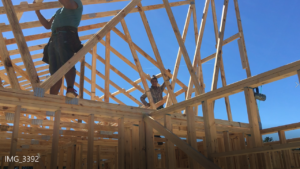Building code, Citizens, and talent!
 The issue of whether our state building code and its different wind standards across the state is strong enough to protect all Florida residents has been the subject of our recent newsletter articles and Florida Insurance Roundup podcasts. Jared Moskowitz, head of the state Division of Emergency Management, recently sat down with Jim Turner of the News Service of Florida to answer some questions, post-Hurricane Dorian.
The issue of whether our state building code and its different wind standards across the state is strong enough to protect all Florida residents has been the subject of our recent newsletter articles and Florida Insurance Roundup podcasts. Jared Moskowitz, head of the state Division of Emergency Management, recently sat down with Jim Turner of the News Service of Florida to answer some questions, post-Hurricane Dorian.
Moskowitz said the state building code wasn’t made for the likes of Dorian. “Do we have a strong building code? Do I think there are tweaks? Yeah, I think there are tweaks. I think we could go back and look. There are areas that flood now that didn’t use to flood. So, I think there are a number of things. Is that something we just have to do this legislative session? No, I think it’s a long conversation,” Moskowitz was quoted.
Meanwhile, the Miami Herald reports a survey of its group of 50 “Florida Influencers” shows more than half (59%) say the state should limit the development on the coast and toughen building standards. The building code sentiment was echoed by an official at the Florida Catastrophic Storm Risk Management Center at Florida State University.
 Citizens Property Insurance: At its quarterly Board of Governor’s meeting on September 25, we learned the jury is still out on what effect Assignment of Benefits (AOB) reform passed by the legislature this spring will have on the frequency and severity of claims lawsuits. The board received a great overview of Citizens in Steve Bitar’s Market Analysis.
Citizens Property Insurance: At its quarterly Board of Governor’s meeting on September 25, we learned the jury is still out on what effect Assignment of Benefits (AOB) reform passed by the legislature this spring will have on the frequency and severity of claims lawsuits. The board received a great overview of Citizens in Steve Bitar’s Market Analysis.
There have been 2,700 new Hurricane Irma claims filed this year with 62% represented by counsel at first notice of loss. From a total of almost 71,000 claims, 3,600 are in litigation and 430 were AOBs. As a percentage of policy count, prior claims represented just 3% back in 2011. Today, that figure is 30% inside the Tri-County area of South Florida and 20% outside that area.
 Talent: Today is the first meeting of the Florida Talent Development Council. Its mission is to develop a coordinated, data-driven, statewide approach to meeting Florida’s needs for a 21st-century workforce that employers and educators use as part of Florida’s talent supply system. The Council, working under the state Department of Economic Opportunity, is tasked with creating a strategic plan to ensure 60% of working-age Floridians hold a high-value postsecondary degree or certificate by 2030. That number currently is 48.3%. According to a legislative analysis, between 2018 and 2025, 64% of the jobs created will require a postsecondary degree or certificate. Florida ranks 21st in the nation for percentage of adults with postsecondary education and high-quality workforce credentials.
Talent: Today is the first meeting of the Florida Talent Development Council. Its mission is to develop a coordinated, data-driven, statewide approach to meeting Florida’s needs for a 21st-century workforce that employers and educators use as part of Florida’s talent supply system. The Council, working under the state Department of Economic Opportunity, is tasked with creating a strategic plan to ensure 60% of working-age Floridians hold a high-value postsecondary degree or certificate by 2030. That number currently is 48.3%. According to a legislative analysis, between 2018 and 2025, 64% of the jobs created will require a postsecondary degree or certificate. Florida ranks 21st in the nation for percentage of adults with postsecondary education and high-quality workforce credentials.
This is an issue that touches all economic sectors and industries in Florida. It’s a crucial component to building a prosperous, diverse, and sustaining state economy in both good and bad economic times.
LMA Newsletter of 10-7-19

